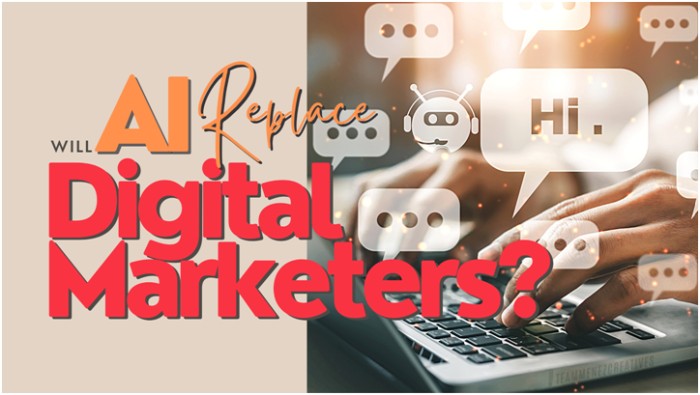
The rise of digital technology for business and technologies and cloud-based touchless solutions give breath and growth to digital marketing.
Digital marketing today is more detailed, technical, and sophisticated than marketing strategies and models of the past. Today, digital marketers also have to develop their aptitude with modern concepts such as machine learning and Artificial Intelligence that impacts user experience and SEO standing.
On the one hand, modern digital tools significantly reduce the risk of failure as a digital marketer. However, these new technologies are also rapidly transforming the way the marketing industry is run. Automation is becoming a concern for most digital marketers if they will still have a job when AI automation in marketing becomes a norm.
Digital marketers need not fear. Even if Artificial Intelligence becomes a norm, it does not mean that they will be outranked and out of jobs merely because progressive technology is in the picture.
But then again, this is a good signal for digital marketers to pick up. If they do not adapt to these modern-day marketing tools and master digital marketing developments, then the chance to get left behind is also huge.
The Need for Marketing Automation
1. CRM
Marketing automation integrates marketing strategies over all channels like web, social, mobile, email, and the like. It synergizes insight-focused CRM capabilities, lead management framework, analytics tools, and more to create campaigns that connect and convert.
2. Task Efficiency
Businesses need marketing automation to achieve their time and expense goals more efficiently. It also lessens errors in the campaign’s different components–from planning, scheduling, task distribution, getting and nurturing leads, funneling orders, publishing content, among many other tasks.
3. Recurring Tasks
Most marketing tasks involved are recurring, and automating the process streamlines the campaign and ensures more accuracy. It helps businesses target consumers creatively with personalized content out of AI and Deep Learning algorithms.
4. Big Data
Big brands use marketing automation purely manage a comprehensive database full of valuable consumer data to draw accurate insights that will be based on strategies.
5. Digital Ads
Digital ads is one of the best fields for artificial intelligence. Facebook, Google, and Instagram use it to provide the best possible experience. These platforms analyze user information like gender, age, interests, demographics, as well as other aspects to show them the most relevant ads to encourage conversions.
6. Marketing Content
AI helps digital marketers discover what content is most effective, according to the behaviour of targeted customers, for the best marketing results. Marketers may develop a greater understanding of what kinds of content perform well for their target audience, helping them to share and create the correct kind of content.
For example, nearly half of millennials most trust video content, so adding videos to your content is now the second most successful method of content marketing next to blogs. A brand targeting this demographic should develop meaningful content using insights obtained from AI.
AI can also be used for content curation. YouTube’s recommendation feature offers video recommendations that may interest viewers based on their past behaviour. Using a similar apps allow you to recommend products, blogs, videos, and various other content based on users’ past searches, purchases, and engagements.
How AI is Changing Digital Marketing Jobs
Like other technological developments in the past, AI and machine learning would undoubtedly generate a demand for new abilities, rather than eliminating jobs altogether. People will always be crucial in marketing, regardless of how modern tools get.
For instance, businesses know that the tools they have do not mean much if they do not have the right people on staff to relatively use these tools, understand data perceptively towards effective campaigns, and relate to their growing consumer base who demand personalization and authenticity more and more.
At this stage, predictive analysis can take over some of the jobs related to mathematics and statistics, mostly in calculations. People also need to view and direct the equations.
Another great example is SEO campaigns. Google has more than 200 algorithm factors to determine SERP (Search Engine Results Page) ranking. Bots find these factors all across the web. It is a challenge to hit all the factors, mainly since Google updates them multiple times daily.
So it is up to the digital marketer to determine which combinations of efforts, tools, strategies, and platforms must be optimized to achieve the best possible results.
Jobs Foreseen to Undergo Dramatic Changes with AI
Experts foresee that warehouse, in-store, and customer support positions are the most vulnerable to big changes due to marketing automation.
In some factories, most human jobs were automated and relegated to AI. In these cases, robots replaced human workers. But although robots are now used in retail, robots are incapable of digital marketing to the extent that humans are.
In content creation, you can also use AI-powered programs now to produce content automatically. Through AI, emails are now easy to personalize and sent in bulk without human intervention. Automated ads are also more popular with platforms like Google and Facebook.
Despite all these, digital marketers and teams are still needed to evaluate gathered data, then towards successful campaigns or create customer experiences. People are still required to plan, write, and track automatic ads and monitor how these ads are performing against the team’s goals.
It cannot be emphasized enough that digital marketers must stay relevant if they arm themselves with proficiency in these modern marketing tools.
Conclusion: Digital Marketers Must Optimize AI, not Fear It
What digital marketers need to do is to realize how rapidly technological trends can evolve and how quickly they must adjust as well. Be up-to-date with automation trends and shifts, so you stand out and remain in dispensable.
AI is now more available to digital marketers and businesses. AI affects the decisions of the clients in large part, leading to much-needed feedback, recommendations, and support. Optimize the technology, instead of fearing it, so you can further develop your brand and fulfill your consumers’ expectations in this new normal economy.
